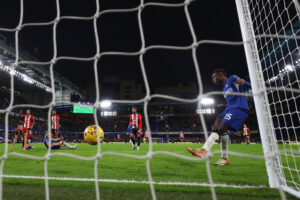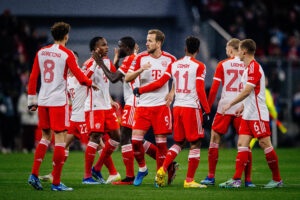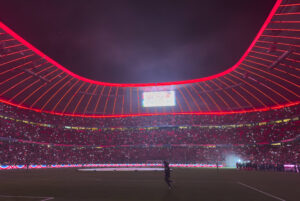The 2014 FIFA World Cup marked the return of one of football’s sleeping giants. Colombia was back on the grandest stage of international football after years of crime, corruption, and under-performing stars. This is the story of how Colombia rose from the terror-filled days of Pablo Escobar, and the frightening influence of narcotic groups, that got the sport in the country it’s own label – ‘narco-soccer’.
Plata
“I’ll make him an offer he can’t refuse” – Don Vito Corleone, Godfather
Pablo Escobar, Colombia’s notorious drug-lord from the late 70’s to the early 90’s had enough wealth to bankroll Colombia’s domestic sides and the national team itself. Largely associated with labels like the ‘King of Cocaine’, his true passion always remained on the football pitch.
America had a rising and persistent demand for cocaine, and Escobar had a continuous production line. The amount of money he could make seemed limitless.The Medellín native was keen on supporting his country’s underperforming stars. With his money, he invested heavily into the team he supported, Atlético Nacional and success followed.
In 1989, with Escobar at the peak of his powers, his contributions to Atlético Nacional helped the side win their first ever Copa Libertadores – South America‘s most prestigious domestic title. His lifelong passion came at a cost for some, with referee Alvaro Ortega paying the ultimate price after a decision went against Nacional in 1989. He was assassinated, with all fingers pointing towards Escobar.
It wasn’t just Escobar who was intent on making his dreams a reality, however. Millionarios, one of Colombia’s most well-known football institutions, won titles in 1987 and 1988, under the ownership of Gonzalo Rodriguez Gacha, an esteemed member of the Medellín Cartel. They admitted to misdoings in 2012 and gave up their titles in a bid to clean up their image.
Dorado
“All men reach and fall, reach and fall” – old ptolemy, alexander
Atlético Nacional’s success in 1989 got Colombian fùtbol the recognition they wanted. Their brand of fast, eye-catching attacking football was making waves all across the planet. The 1990 World Cup was the first taste the world would get of this fine Colombian team, their first ‘Generación de Oro‘.
The World Cup of 1990 in Italy expected a lot of Colombia. A side which had the likes of René Higuita, Freddy Rincón, and captain Carlos Valderrama. They won their first game against minnows United Arab Emirates by two goals to nil. The side were high on morale but failed to capitalise.
Yugoslavia got the better of them in the next game in Bologna, winning 1-0. A win was needed in the final game to qualify but it was no easy task however. West Germany, led by the legendary Franz Beckenbauer, awaited. A spirited performance saw them rescue a point in the dying seconds of the game as Colombia qualified for the 2nd Round, but only as one of the best third-placed teams.
Another team making waves at the World Cup was Cameroon, who were winners of their group which consisted of eventual runners-up Argentina. Cameroon were the second African team to make it this far at the World Cup, and they were hoping to go even further. Colombia stood between them and the quarter-finals.
Like Colombia, Cameroon were experiencing a ‘golden generation’ of their own. With Roger Milla and Eugene Ekéké amongst their ranks, they felt this was their chance. Their clash with Colombia in Naples went to extra time, where Milla scored twice in quick succession for Cameroon. Bernardo Redín got a goal back, but it was mere consolation. Colombia were on their way out, the golden generation had failed.
Oportunidad
“There’s no certainty – only opportunity.” – V, V for vendetta
The 1994 World Cup in the United States was another opportunity to impress. Colombia had an impeccable qualifying campaign, as they topped a group containing Peru, Paraguay and Argentina – who they famously beat 5-0 in Buenos Aires.
Pablo Escobar’s death in December 1993 saw positivity amongst the Colombian faithful. They thought the era of narco-terrorism would diminish bit by bit and the term ‘narco-soccer’ would disappear from the lexicon. There was hope that the 1994 World Cup would officially put Colombia on the map solely for its footballing exploits.
Colombia kicked off their World Cup campaign against Romania. Expectations weighed heavy on the players, as they fell to a sorry 3-1 defeat. The next game was against the hosts USA where they succumbed to pressure again. Earnie Stewart added to Andrés Escobar’s own goal to give the USA a 2-0 lead before the hour. Adolfo Valencia earned a late consolation. Colombia were out of the World Cup after two matches.
Switzerland were their last opponents, but they had nothing except pride to play for. Pride which they kept. A 2-0 win with goals from Hernán Gaviria and John Harold Lozano meant Colombia left The States with something to be proud of, or so they thought.
Plomo
“Fear of death is what keeps us alive” – Doctor mccoy, star trek beyond
Pablo Escobar’s death brought the exact opposite of what the Colombians had hoped for. His killing also killed off fùtbol in the country. Teams had no money, corruption, betting and the emergence of other cartels saw the dark days return to Colombia, one of which had the whole nation in shock.
A fine day in July 1994, with Colombia still reeling from their World Cup horror, Andrés Escobar, the man who scored an unfortunate, yet decisive, own goal against the United States was shot to death.
Humberto Castro Muñoz, bodyguard of Peter David and Juan Santiago Gallon Henao, who were members of Los Pepes, the group who set out to kill Pablo Escobar, confessed to the murder and was sentenced to 43 years in jail. One theory claims the Gallon brothers heavily bet on the national team and were frustrated when they lost.
Six bullets through the man, who was an icon to the Colombian faithful put the nation in distress and forced several stars to retire. Many believe that if Escobar had been alive, Andrés would’ve been too. Pablo Escobar was a friend to many members of the national team, and an avid fan of football.
The assassination raised eyebrows, created investigations and a massive reform. The country has since risen from the dark days of narco-soccer in the 90’s and has a new, improved and better ‘golden generation’.
Ilusión
“Let the games begin!” – bane, the dark knight rises
The current crop of players representing Colombia look better than ever. With James Rodríguez, Carlos Bacca, and David Ospina amongst their ranks, this generation looks set for greater things.
They proved their mettle in Brazil in 2014, reaching the quarter-finals of the World Cup for the first time in their history. And perhaps they could go one better next time. Atlético Nacional won the Copa Libertadores for the second time in their history, except that this time, there was no influence from terror groups or bribing scandals.
After tough days in the 80’s and the 90’s this current crop of players looks set to erase the failures of their predecessors and the horrible killing of Andrés Escobar. The days of narco-soccer are seemingly over, and this golden generation could finally be the pride of Colombia.
Main Photo






